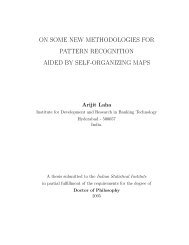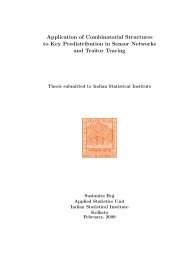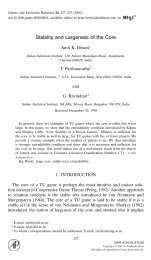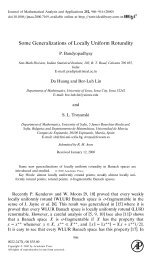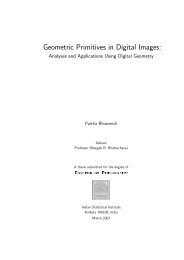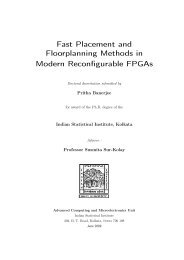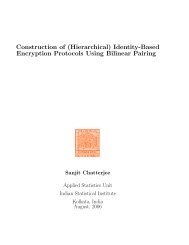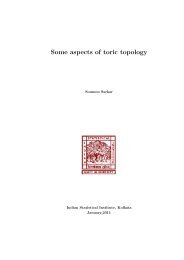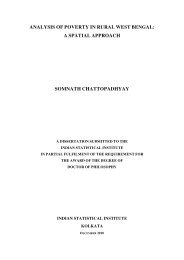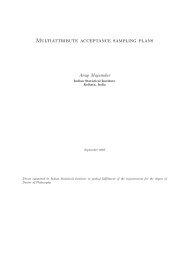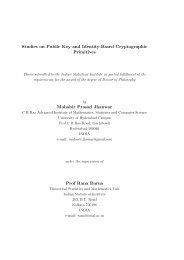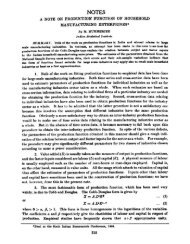Cryptanalysis of RSA Factorization - Library(ISI Kolkata) - Indian ...
Cryptanalysis of RSA Factorization - Library(ISI Kolkata) - Indian ...
Cryptanalysis of RSA Factorization - Library(ISI Kolkata) - Indian ...
You also want an ePaper? Increase the reach of your titles
YUMPU automatically turns print PDFs into web optimized ePapers that Google loves.
Abstract<br />
In this thesis, we propose some new results in <strong>Cryptanalysis</strong> <strong>of</strong> <strong>RSA</strong> and related<br />
<strong>Factorization</strong> problems. Till date, the best known algorithm to solve the Integer<br />
<strong>Factorization</strong> problem is the Number Field Sieve, which has a runtime greater<br />
than exp(log 1/3 N) for factoring an integer N. However, if one obtains certain<br />
information about the <strong>RSA</strong> parameters, there are algorithms which can factor the<br />
<strong>RSA</strong> modulus N = pq quite efficiently. The intention <strong>of</strong> this thesis is to identify<br />
such weaknesses <strong>of</strong> the <strong>RSA</strong> cryptosystem and its variants. Further we study<br />
results related to factorization.<br />
In Africacrypt 2008, Nitaj presented a class <strong>of</strong> weak keys in <strong>RSA</strong> considering<br />
certain properties <strong>of</strong> the encryption exponent e. We show that this result can<br />
be generalized from different aspects. We consider the cases when e satisfies an<br />
equation <strong>of</strong> the form eX−ψY = 1 under some specific constraints on two integers<br />
X,Y and a function ψ. Using the idea <strong>of</strong> Boneh and Durfee (Eurocrypt 1999,<br />
IEEE-IT 2000), we show that the LLL algorithm can be efficiently applied to get<br />
ψ in cases where Y satisfies certain bounds. This idea extends the class <strong>of</strong> weak<br />
keys presented by Nitaj when ψ is <strong>of</strong> the form (p−u)(q −v) for <strong>RSA</strong> primes p,q<br />
and integers u,v. Further, we consider the form ψ = N −pu−v for integers u,v<br />
to present a new class <strong>of</strong> weak keys in <strong>RSA</strong>. This idea does not require any kind<br />
<strong>of</strong> factorization as used in Nitaj’s work.<br />
Next, we analyze the security <strong>of</strong> <strong>RSA</strong> where multiple encryption are available<br />
for the same modulus N. We show that if n many corresponding decryption<br />
exponents (d 1 ,...,d n ) are generated, then <strong>RSA</strong> is insecure when d i < N 3n−1<br />
4n+4 , for<br />
all i, 1 ≤ i ≤ n and n ≥ 2. Our result improves the bound <strong>of</strong> Howgrave-Graham<br />
and Seifert (CQRE 1999).<br />
We also discuss the factorization <strong>of</strong> N by reconstructing the primes from randomly<br />
known bits. We revisit the work <strong>of</strong> Heninger and Shacham (Crypto 2009)<br />
and provide a combinatorial model for the reconstruction where some random bits<br />
<strong>of</strong> the primes are known. This shows how one can factorize N given the knowledge<br />
<strong>of</strong> random bits in the least significant halves <strong>of</strong> the primes. We also explain a<br />
lattice based strategy in this direction. More importantly, we study how N can be<br />
factored given the knowledge <strong>of</strong> some blocks <strong>of</strong> bits in the most significant halves<br />
<strong>of</strong> the primes. We present improved theoretical result and experimental evidences<br />
in this direction.<br />
i



